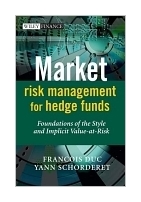|

MARKET RISK MANAGEMENT FOR HEDGE FUNDS
DUC F., SCHORDERET Y. wydawnictwo: WILEY , rok wydania 2008, wydanie I cena netto: 360.00 Twoja cena 342,00 zł + 5% vat - dodaj do koszyka This book provides a cutting edge introduction to market risk management for Hedge
Funds, Hedge Funds of Funds, and the numerous new indices and clones launching coming to
market on a near daily basis. It will present the fundamentals of quantitative risk
measures by analysing the range of Value-at-Risk (VaR) models used today, addressing the
robustness of each model, and looking at new risk measures available to more effectively
manage risk in a hedge fund portfolio.
The book begins by analysing the current state of the hedge fund industry - at the ongoing
institutionalisation of the market, and at its latest developments. It then moves on to
examine the range of risks, risk controls, and risk management strategies currently
employed by practitioners, and focuses on particular risks embedded in the more classic
investment strategies such as Long/Short, Convertible Arbitrage, Fixed Income Arbitrage,
Short selling and risk arbitrage. Addressed along side these are other risks common to
hedge funds, including liquidity risk, leverage risk and counterparty risk.
The book then moves on to examine more closely two models which provide the underpinning
for market risk management in investment today - Style Value-at-Risk and Implicit
Value-at-Risk. As well as full quantitative analysis and backtesting of each methodology,
the authors go on to propose a new style model for style and implicit Var, complete with
analysis, real life examples and backtesting. The authors then go on to discuss
annualisation issues and risk return before moving on to propose a new model based on the
authors own Best Choice Implicit VaR approach, incorporating quantitative analysis, market
results and backtesting and also its potential for new hedge fund clone products.
This book is the only guide to VaR for Hedge Funds and will prove to be an invaluable
resource as we embark into an era of increasing volatility and uncertainty.
Table of Contents
Contents
Acknowledgements
1 Introduction
Part I Fundamentals for Style and Implicit Values-at-Risk
2 Ongoing Institutionalization
2.1 Hedge funds industry size and asset flows
2.2 Style distribution
2.3 2006-2007 structural developments
2.4 Are hedge funds becoming decent?
2.5 Funds of hedge funds persistence
3 Heterogeneity of Hedge Funds
3.1 Testing sample
3.2 Smoothing effect of a restrictive classification
3.3 Heterogeneity revealed through Modern Cluster Analysis
3.4 Appendix A: Indices sample
4 Active and Passive Hedge Fund Indices
4.1 Illusions fostered by active hedge fund indices
4.2 Passive indices and the illusion of being clones
4.3 Conclusion
5 The Four Dimensions of Risk Management for Hedge Funds
5.1 Operational and structural risk
5.2 Risk control
5.3 Delegation risk
5.4 Direct investment risk
5.5 Conclusion
5.6 Appendix B: Risks embedded with some classical alternative strategies
5.7 Appendix C: Other common risks to hedge funds
Part II Style Value-at-Risk
6 The Original Style VaR Revisited 77
6.1 The Multi-Index Model
6.2 The Style Value-at-Risk
6.3 Backtesting revisited
7 The New Style Model
7.1 Extreme Value Theory
7.2 Risk consolidation
7.3 The New Style Model
7.4 Appendix D: Algorithms for the elemental percentile method
7.5 Appendix E: Copulas
8 Annualization Problem
8.1 Annualization of the main statistical indicators assuming i.i.d.
8.2 Annualization of Value-at-Risk assuming i.i.d.
8.3 Annualization without assuming i.i.d.
8.4 Applications to the Style Value-at-Risk
8.5 Appendix F: annualization of excess kurtosis
8.6 Appendix G: Drost and Nijman Theorem
Part III Implicit Value-at-Risk
9 The Best Choice Implicit Value-at-Risk
9.1 Alternative style analysis and BCI Model
9.2 Theoretical framework of BCIM
9.3 Best Choice Implicit VaR
9.4 Empirical Tests
10 BCI Model and Hedge Fund Clones
10.1 Ten-Factor Model
10.2 Non-Linear Model
11 Risk Budgeting
11.1 Value-at-Risk of a multi-managers portfolio
11.2 Risk decomposition: 'before and after' attribution
11.3 Risk decomposition: closed form attribution
12 Value-at-Risk Monitoring
12.1 Analyzing graveyards and hedge funds demise
12.2 The probit model
12.3 Empirical evidence
12.4 Implications for portfolio management
13 Beyond Value-at-Risk
13.1 2007-2008 liquidity crisis and hedge funds
13.2 Mechanical stress test
13.3 Liquidity-adjusted Value-at-Risk
13.4 Limit of liquidity-adjusted Value-at-Risk and liquidity scenario
Bibliography
Index
272 pages, Hardcover
Po otrzymaniu zamówienia poinformujemy,
czy wybrany tytuł polskojęzyczny lub
anglojęzyczny jest aktualnie na półce księgarni.
|


